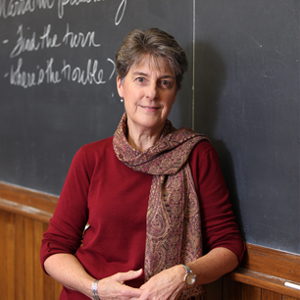Empowering Daring Witness in Today’s Challenging Times
April 19, 2021 | Academics, Alumni, Faculty, Featured, Practical Theology, Preaching, Public

All the books written by Sally Brown, Princeton Theological Seminary’s Elizabeth M. Engle Professor of Preaching and Worship, PhD ’01, are ones that she wanted on her shelves but couldn’t find. Her latest, Sunday’s Sermon for Monday’s World: Preaching to Shape Daring Witness, published by Eerdmans Publishing in April 2020, helps preachers design sermons that empower their congregations to act with creative courage in their regular Monday-to-Saturday lives. This is particularly important now, she says, as the idea of church as a public space has largely disappeared.
“I make the case in the book that the way we testify with our actions is like jazz improv,” Brown says. “Every person and situation is different, so we have to be inventive in the way we give expression to our faith. I explore how to preach to help people look at the everyday spaces of their lives as places where God is active and to see hope.”
Brown argues that in today’s difficult times, with a politically divided nation, COVID-19, and racial injustice, it’s even more imperative to “embody the faith and hope that God is changing the world, moving us toward something more loving and just.” And these current challenges are also an interest for current and future scholarship: specifically, how to speak to a congregation where there is “mutual mistrust in the pews.” Christian belief has inherent political implications, she notes, as Jesus spoke often about money, the dividing lines in society, and abuse of power.
“This is a big challenge for preachers that is both a crucial skill, and yet difficult to manage,” she says. “We can’t be true to the texts of our tradition and not discuss human suffering, and the many ways abuse of power causes that suffering — whether economic, political, or policing power. How do we do that in churches — where attendance is voluntary — without people walking out?”
Brown recently explored these themes in an article for Acta Theologica, a South African theological journal. She listened to dozens of sermons given the two Sundays after George Floyd’s death in both Black and White congregations, conservative and progressive. While in most cases preachers, regardless of the demographic in the pews, focused on both COVID-19 and the Black Lives Matter protests, some conservative White preachers did not touch on racial justice. We should remember that throughout history, she says, preachers have raised issues about the abuse of power at great risks to their careers, and their very lives.
Her best advice for preachers is to find other preachers with whom they can share encouragement and ideas, and read books or blogs that address “how to stay in the room with someone who disagrees with you” in the name of your common faith. “The questions and needs of the people in the pews are constantly shifting, and we must adapt, yet tell hard truths.”
At Princeton Seminary, Brown teaches preaching, hermeneutics, and homiletical theory and directs the annual Engle Institute of Preaching. She was promoted to full professorship last fall. Jacqueline Lapsley, dean and vice president of Academic Affairs and professor of Old Testament, praises Brown’s work, sharing “Professor Brown’s promotion to full professor is a fitting recognition of her excellent scholarship and teaching, as well as her prominence as a major leader in the field of homiletics. In addition, her service to Princeton Seminary over the years has been exemplary; she is a treasured colleague in our shared mission.”





